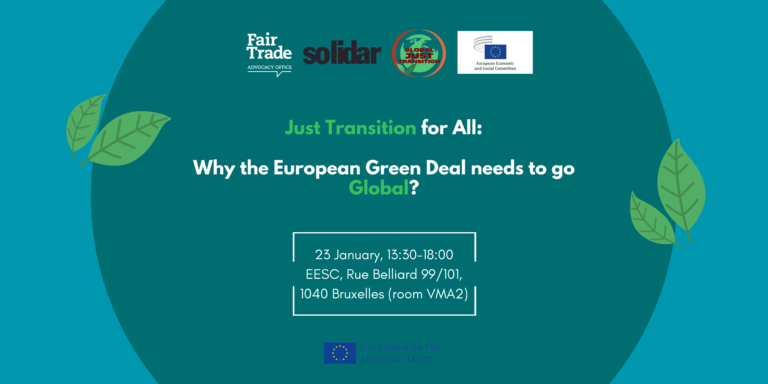COP26: Yet another missed opportunity – By Simona Fabiani, CGIL
November 18, 2021
The 26th UN conference on climate change has just ended in Glasgow. In the midst of a climate emergency – the World Health Organisation calls it the greatest threat to human health in our time – the final decision was inadequate.
We are aware that, considering a unanimous decision was required, it was not easy to adapt the different needs of Western countries to suit those of developing nations such as China and India, and those of the poorest and most vulnerable countries in Africa, Asia, the Pacific and the Caribbean, which have the least responsibility but are among the greatest victims of climate change. We just cannot be satisfied with the fact that following the outcome of the Cop26, multilateralism has finally been saved because there is a shared final text and that, although it is a very important sign of détente, the US and China have issued a joint communiqué in which they promise to work together to strengthen the commitments of the Paris Agreement.
Our negative assessment is based on the contents of the Glasgow Climate Pact, which are totally inadequate compared to the impact climate change is already having on human lives:
– it again asserts the goal of keeping the global average temperature increase well below 2°C compared to pre-industrial levels and continuing efforts to limit the temperature increase to 1.5°C, recognising that this would significantly reduce the risks and impacts of climate change. This reiterates, 6 years later, what was already envisaged in the 2015 Paris Agreement; but without further concrete commitments, these are just empty words. The final text foresees an annual review of the 2030 reduction commitments starting in 2022 and of their being strengthened before Cop27. This is an important step but as these are voluntary targets, we need to see how ambitious the responses of the various countries will be. Human activities have already caused an increase in global average temperature of 1.1°C and the undertakings made by countries (NDCs), if not increased, will lead to an average increase of 2.4°C, assuming they are met;
– it recognise that limiting global warming to 1.5°C requires rapid, deep and sustained reductions in global GHG emissions, including cutting global CO2 emissions by 45% by 2030 compared to 2010 levels and to net zero around mid-century, and deep reductions in other GHGs. Such awareness is important, but it clashes with the fact that current NDCs will result in a 13.7% increase in emissions in 2030 compared to 2010, and Cop26 postpones the adoption of the roadmap to reduce climate-changing emissions up to 2030 until next year; it calls for efforts to be speeded up to phase out coal use and inefficient fossil fuel subsidies. India rejected a previous text which talked about phasing out coal; the fact is that there is no precise date for phasing out the use of coal and other fossil fuels, and overcoming subsidies, the gradual elimination of which will only involve those considered to be inefficient, as if efficient subsidies existed to support fossil fuels;
– it acknowledges the growing needs of developing countries caused by the increasing impacts of climate change and rising debt due to the pandemic as well as the fact that the commitment made by developed countries in 2009 to mobilise USD 100 billion per year as and from 2020 to support developing countries has not been fulfilled and that these resources are in any case not sufficient, but, apart from the pleas to governments and financial institutions, there are no concrete initiatives aimed at providing developing countries with financial and technological support, neither for mitigation, nor for adaptation, nor for covering the costs of losses and damage caused by climate change.
At Cop26, the Italian government did not shine in terms of ambition: it did not sign the agreement on petrol and diesel engines; it signed the Boga (Beyond oil & gas) alliance without any commitment (only as a “friend”); and it did not participate in the press conference convened by Germany, Spain and five other countries against the inclusion of nuclear power in the regulation on the EU taxonomy for sustainable activities.
Once again, the Italian government’s lack of vision for an ecological transition is confirmed, both on the social side as regards protection and job creation, and on the environmental side – even airing the possibility of a return to nuclear power – and risks making us miss the extraordinary opportunity offered by European resources for a radical and necessary change in the development model based on equity and the well-being of people and the planet.
Cop26 is over, but not the Italian General Confederation of Labour’s fight for climate and social justice. We will continue to pursue our demands, starting from the contents of our 2018 “Integrated platform for sustainable development” and the unitary documents “For a model of sustainable development” and “Platform for a just transition”, in dealings with the government and local authorities, including for the use of the resources of the NRRP and the 2021-2027 cohesion funds, as well as in collective bargaining at all levels.
Simona Fabiani is the Environment and Territory Manager of the Confederazione Generale Italiana del Lavoro (CGIL) – The Italian General Confederation of Labour





